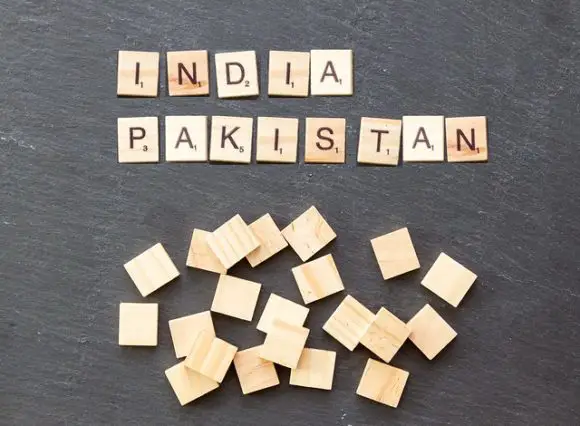Indo-Pak relations can be discussed under the following heads :-
History :-
At the time of independence, British India was partitioned into countries i.e. India and Pakistan. Muslim league demanded a separate country for the Muslims as they feared that in a Hindu majority India, they may go unrepresented. Though Pakistan was a country for Muslims but the Indian leaders decided that India would be secular nation. Both the countries witnessed a violent partition, as there were riots on both the side on religious grounds.
Language, Art and Culture :-
There is a huge overlap in the language and cuisine of both the countries as they were ruled by the Mughals for around 300 years. Both the countries have a fair number of Muslims, Sikhs and Hindus (India is a home to more number of Muslims than Pakistan). Pakistani music has a huge fan base in India and same is the case with Indian movies and actors in Pakistan.
Economics :-
Before India’s withdrawal of MFN status from Pakistan and imposing 200% import duties in aftermath of Pulwama attacks, major imports from Pakistan included fresh fruits, cement, petroleum products, bulk minerals and ores and finished leather and Indian exports included raw cotton, cotton yarn, chemicals, plastics, manmade yarn and dyes.
Geo politics :-
Since both the countries have a common past, umpteen similarities, Geo-politics has a major role to play in their relations. One of the most prominent and seemingly everlasting issue is of Kashmir. According to the rules of merger for the princely states of the pre independent India, Kashmir refused to join both India and Pakistan and wanted to be an independent state, but Pakistan sent it’s army for annexure of Kashmir. On Raja Hari Singh’s request India agreed to help but on certain conditions which led to Kashmir being a part of India with article 370. Pakistan refused to give up the occupied area of Kashmir before ceasefire and that part of Kashmir is known as POK. Since then Kashmir is the bone of contention between the two countries and Pakistan keeps on playing dirty games which results in constant unrest in Kashmir.
Both the countries also signed ‘Indus Water Treaty (IWT)’ in 1960, brokered by World Bank for peaceful sharing of the water of river Indus and it’s tributaries.
A major initiative was taken in last November as both the sides agreed to set up the Kartarpur Corridor to link the historic Gurdwara Darbar Sahib – the final resting place of Sikh faith’s founder Guru Nanak Dev – to Dera Baba Nanak in Gurdaspur. A welcome which ‘may’ result in reducing bitterness between the countries.
Defence and Security :-
This header is the first thing that comes to mind when someone hears India Pakistan relations as India and Pakistan have fought 4 full length wars till date. Over the years both of them emerged as nuclear powers so there is barely any chance of a conventional war, as a result there is a proxy war going on between the countries. Pakistan has been allegedly sheltering, funding, feeding and training terrorists against India. Though Pakistan publicly denies resorting to any such methods, there are infinite proofs that Pakistan shelters terrorists. As per many reports, apart from sending terrorists through Kashmir in India it has been funding and supplying arms to the rebel groups in Kashmir to recruit and train Kashmiri youth to fight against India. Apart from wars there has been continued events of ceasefire violation at the LOC.
Diplomacy :-
Pakistan has an overwhelming support of China in all areas be it technology, defence, finance etc. China also supports Pakistan’s stance on Kashmir, and has been continuously exercising it’s veto in the UN favouring Pakistan’s terrorist organizations. One of the China’s many reasons to support Pakistan is to keep India engaged in these issues as it sees India as a serious competitor in it’s goal to dominate Asia and the world.
Right from the time of Independence Russia has played a major role in India’s development in all aspects and in order to neutralize Russian involvement in South Asian politics, USA has supported Pakistan by providing arms, fighter aircrafts and funds.
Conclusion :-
Despite being similar to India in numerous aspects, having fertile land and a huge reserve of natural resources Pakistan has been lagging far behind in terms of development. It’s high time that Pakistan ends all kinds of enmity, direct or indirect with India and focuses on it’s development, prosperity of Pakistanis and reducing China’s debt as it has already come a long way in losing it’s sovereignty to China. India is ready to help Pakistan by all means like an elder brother for Pakistan’s development, once it ends terrorism and stops ceasefire violations.
Your Turn…
What are your thoughts on this topic? Tell us through the comment section below. Subscribe to our blog to read answers to trending GD topics.
Pic Credits: Twitter Trends 2019 via Flickr under CC 2.0
Copyright @ Group Discussion Ideas.

